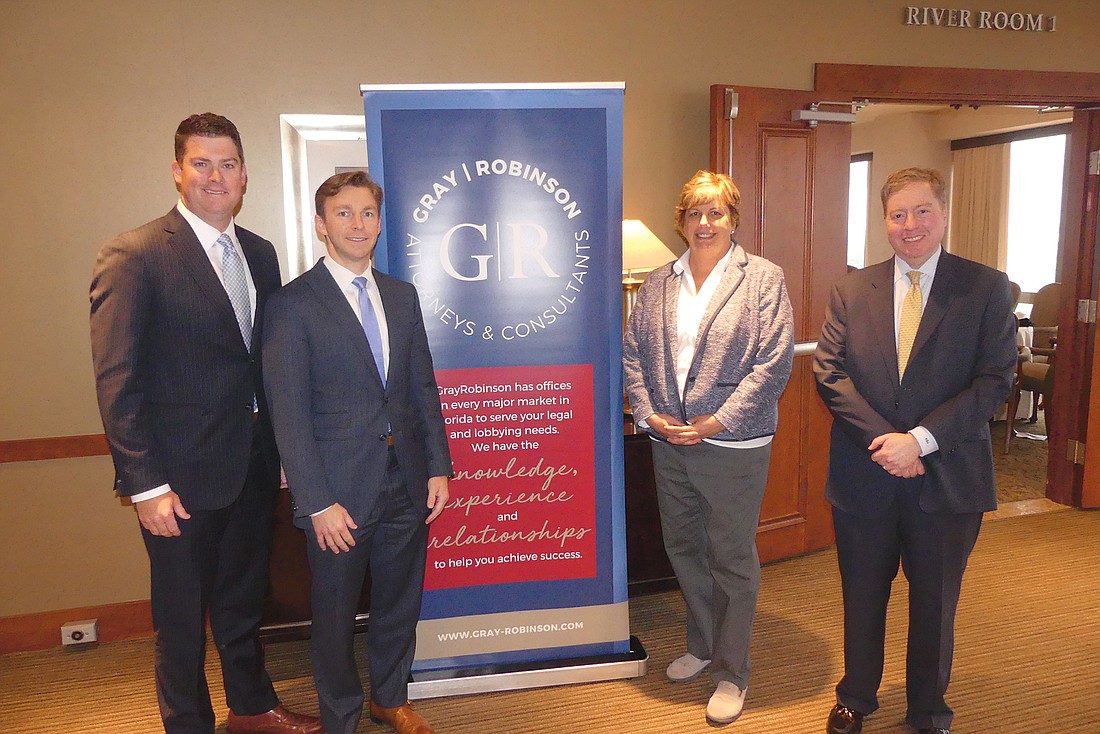
The GrayRobinson law firm’s state government affairs and lobbying team was at The River Club in Jacksonville on Monday to present a report on the state Legislature’s 61-day 2019 session that ended May 3.
“It was interesting and entertaining,” said Jacksonville office Managing Director Kenneth Jacobs as he introduced the panel: Chris Carmody, Kim McDougal and Robert Stuart.
“Every year is different in Tallahassee,” said Stuart, GrayRobinson senior government affairs consultant.
This year was even more different, said McDougal, also a senior government affairs consultant, because of the number of new faces in the Legislature.
There were 47 new House representatives and 10 new senators, in addition to new governor Ron DeSantis, who now is considering the bills passed for approval or veto.
In the session, 3,568 bills were filed — 2,583 in the House and 985 in the Senate.
Only 197 were passed and landed on the governor’s desk.
The state budget also was approved by the Legislature, the largest state budget in history and a “behemoth,” Stuart said.
It’s a $91.1 billion spending plan that appropriates $221 million for hurricane recovery, $22.5 billion for education, $37.6 billion for health care and $5.4 billion for civil and criminal justice.
Appropriations in the budget for Jacksonville projects include $8 million for urban core workforce housing, $2 million for the renovation of Lassiter Hall at the University of North Florida, $1 million for the Northwest Jacksonville STEM Center for Teens and $750,000 to install new pedestrian crossings.
Of the education funding, $12.5 is devoted to K-12, including a $75 per pupil increase in state funding, compared to the 46-cent increase per pupil in last year’s budget, Stuart said.
GrayRobinson shareholder and lobbyist Chris Carmody said the budget includes $650 million for water quality and programs intended to control algae in the state’s waterways.
“There’s some thought that the Department of Environmental Protection can’t spend that much in one year,” Carmody said.
Sales tax holidays and a reduction in a business tax also made it to the governor’s desk.
The Aug. 2-6 back-to-school sales tax holiday will exempt computers under $1,000 as well as clothes under $60 and school supplies under $15.
A sales tax holiday May 3-June 6 on hurricane preparedness supplies will exempt merchandise priced $50 or less.
Some good news for business owners: The tax on office space leases will be reduced from the current 5.7% to 5.5% in 2020.
Carmody said a 60-page bill was passed that will make some substantial changes to state election laws.
Primary elections will be moved back to 11 weeks before a general election from the current 10. It moves up the last day voters can request a vote-by-mail ballot from six days to 10 days before an election.
Also, the no-solicitation zone at polling places will be expanded from 100 feet to 150 feet.
In what was described as “among the most hotly debated and controversial issues of the sessions,” the Legislature prohibited “sanctuary city” policies at the local government level and requires state and local law enforcement to comply with U.S. Immigration and Customs Enforcement.
The House and Senate debated the language of the bill until the 59th day of the 61-day session.
Stuart, who was a legislative aide in the Florida House before he joined GrayRobinson’s lobbying department 12 years ago, said the session was marked by less animosity between lawmakers and the administration than in past years.
“They seemed to get along. The governor has a level of deference to legislators that previous governors didn’t have,” Stuart said.